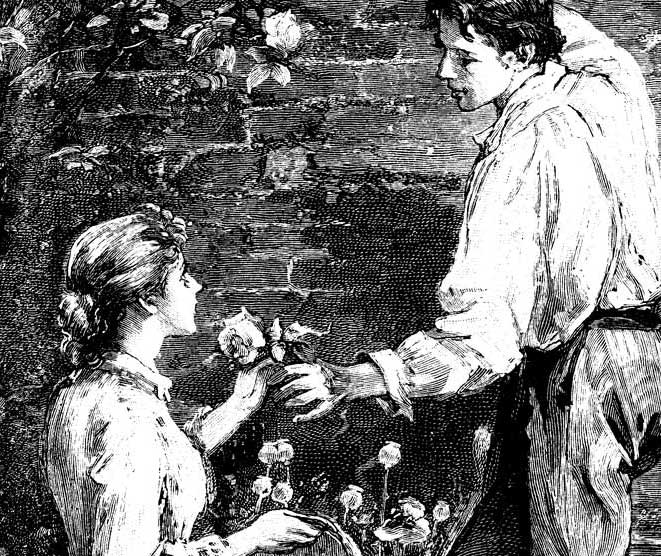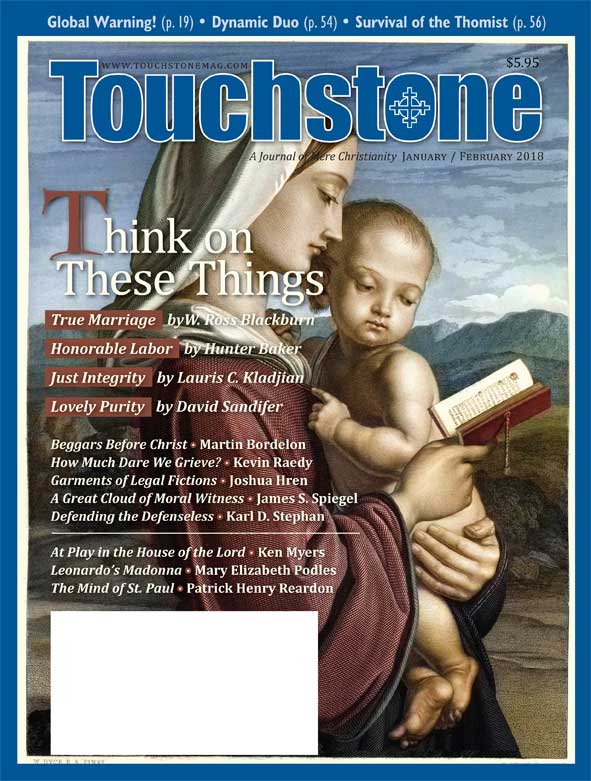Feature
In Defense of Prudery
The Wisdom of the Victorian Quest for Innocence by David Sandifer
In 1818, Dr. Thomas Bowdler published his landmark Family Shakespeare, the subtitle of which announced that "those words and expressions are omitted which cannot with propriety be read aloud in a family." By mid-century it was the best-selling edition of the bard. In the typical Victorian home, this (or one of its even more severely excised competitors) was the edition that would have been found on the library shelf.
Bowdlerism is one of many manifestations of that most stereotypical of all Victorian qualities: its famed "prudery." And while the Victorians themselves have been largely rehabilitated from the ridicule that they were subject to in the popular imagination for much of the twentieth century, the reason for that ridicule has not; their increased respectability has been achieved (perversely) at the expense of downplaying their sexual conservatism in favor of highlighting the variability and paradoxes of Victorian culture.
But that conservatism itself, especially with respect to public morals, remains an embarrassment—the word "bowdlerism," after all, is only ever used pejoratively. Indeed, Victorian conservatism continues to be seen as an awkward detour in the grand liberal project of emancipation, which otherwise seems to flow uninterrupted from the Enlightenment forward. Yet the Victorian quest for innocence in fact reflects something much more profound: the flowering of a deeply Christian vision of sexuality into broad cultural norms. In a society bent on normalizing perversion and marginalizing purity, it is a vision that twenty-first-century Christians would do well to study.
The Ethic of Innocence
While no piano legs were ever modestly draped in nineteenth-century Britain, it is no caricature to say that concerns for a purified public space were central to Victorian morality. In fact, one may justly speak of an "ethic of innocence" as one of the defining aspects of the culture of the period. It was not just the popularity of bowdlerized works that marked a shift in the early part of the century. The theater simultaneously became more chaste and declined in popularity, as even the purified version became less creditable. Novels adopted a more upright tone—best epitomized in the works of Sir Walter Scott and, especially, Jane Austen—characteristic of a genre of "religious-didactic fiction" popular during the period. The upper classes no longer flaunted their excesses, and the lower classes, in their quest for respectability and under the growing influence of Methodism, moderated their coarseness and lewdness. An entire culture of bawdy satirical prints, which had thrived in the late eighteenth century, had disappeared by the 1820s.
It was a transformation that was noted with amazement by many at the time. The tailor and social reformer Francis Place meticulously documented the changes that had taken place in one generation among the working classes, noting, for example, that the lewd songs that were commonly sung in his youth "have all disappeared and are altogether unknown." At the other end of the social spectrum, Sir Walter Scott's great-aunt expressed her astonishment when she re-opened a novel she had enjoyed in her youth: "I found it impossible to get through . . . but is it not odd that I, an old woman of eighty and upwards, sitting alone, feel myself ashamed to read a book which sixty years ago I have heard read aloud for large circles consisting of the first and most creditable society in London?"
While historians continue to argue over what caused these changes, it is clear that they didn't emerge out of nowhere. Societies for the reformation of manners had existed since the late seventeenth century, attempting with various degrees of success to bring about moral reform. The eighteenth century had seen the rise of a "culture of sensibility," expressed in the likes of Samuel Johnson, which sought to soften and refine the mores of the middle and upper classes. Most significantly, the Evangelical Revival—the British expression of the Great Awakening—had acted as a spiritual leaven throughout British society, eventually reaching its most elevated stations by the late eighteenth century. William Wilberforce famously identified a "reformation of manners" as one of the "two great objects" that God had set before him, but he was not alone; multiple historical forces served to catalyze pre-existing beliefs into a growing consensus for the need for a purified public space.
Three Pivotal Beliefs
Among these beliefs, three in particular stand out. In the first place, the Victorians inherited a view of human nature that saw moral traits as radically plastic. This meant that every book, every play, every conversation, indeed, every aspect of one's environment, was viewed as contributing either positively or negatively toward the development of one's character. While Locke had famously referred to this in terms of a "blank slate," a more frequently used image to describe this pervasive dynamic was that of the garden: it will grow either weeds or flowers, depending entirely on what is sown—and it will not grow nothing. "Culture" (it is easy to forget the derivation of the word) thus consists in implanting the right sorts of things and in keeping the wrong sorts away.
Media in particular were viewed as having a decisive effect in shaping individuals and society, with Thomas Carlyle going so far as to argue that the influence of books and periodicals exceeded that of the pulpit, and likening their authors to a "priesthood." The controversy in the first part of the century over the poems of Lord Byron, virtually incomprehensible to modern readers, must be understood in this light: he was not viewed merely as morally reprehensible, but as truly dangerous—one journal accused him of flinging "firebrands in sport," while Thomas Macaulay asserted that he had corrupted a whole generation with a defective ethical system.
David Sandifer teaches ethics and practical theology at Tyndale Theological Seminary in Amsterdam. His Ph.D. (Cambridge, 2014) looked at concerns about the protection of moral innocence in early nineteenth-century Britain. Previously, he served as a pastor in the U.S. and Australia, and he co-founded Porn Harms Kids in Australia (later echildhood.org).
subscription options
Order
Print/Online Subscription

Get six issues (one year) of Touchstone PLUS full online access including pdf downloads for only $39.95. That's only $3.34 per month!
Order
Online Only
Subscription

Get a one-year full-access subscription to the Touchstone online archives for only $19.95. That's only $1.66 per month!
bulk subscriptions
Order Touchstone subscriptions in bulk and save $10 per sub! Each subscription includes 6 issues of Touchstone plus full online access to touchstonemag.com—including archives, videos, and pdf downloads of recent issues for only $29.95 each! Great for churches or study groups.
Transactions will be processed on a secure server.
more on family from the online archives

31.5—September/October 2018
Errands into the Moral Wilderness
Forms of Christian Family Witness & Renewal by Allan C. Carlson
more from the online archives
calling all readers
Please Donate
"There are magazines worth reading but few worth saving . . . Touchstone is just such a magazine."
—Alice von Hildebrand
"Here we do not concede one square millimeter of territory to falsehood, folly, contemporary sentimentality, or fashion. We speak the truth, and let God be our judge. . . . Touchstone is the one committedly Christian conservative journal."
—Anthony Esolen, Touchstone senior editor













